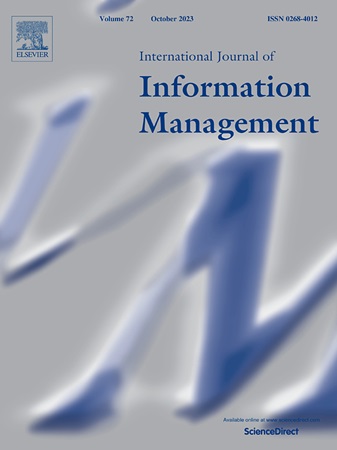The dark side of employee-generative AI collaboration in the workplace: An investigation on work alienation and employee expediency
IF 27
1区 管理学
Q1 INFORMATION SCIENCE & LIBRARY SCIENCE
International Journal of Information Management
Pub Date : 2025-04-03
DOI:10.1016/j.ijinfomgt.2025.102905
引用次数: 0
Abstract
Generative AI (GenAI) has emerged as a powerful tool in the modern workplace, delivering significant benefits to both employees and organizations. As its adoption gains momentum, understanding the potential risks associated with employee-GenAI collaboration becomes increasingly important. While much of the existing research emphasizes the challenges GenAI presents to employees as individuals, this study shifts the focus to explore broader organizational risks, particularly unethical workplace behaviors. Drawing on human-AI collaboration research and the job demands-resources model, we develop and empirically test a novel model to explain how and when employee-GenAI collaboration may lead to employees’ unethical behavioral outcomes in daily organizational contexts. Using an experience sampling approach with longitudinal data from 229 service industry employees, encompassing 1050 matched daily observations, our findings reveal that employee-GenAI collaboration increases work alienation—a sense of disconnection from work—which, in turn, drives employee expediency that compromises work standards. Furthermore, we demonstrate that this effect is pronounced under high digital job demands. By highlighting this unintended consequence, our study contributes to theoretical advancements in understanding the darker side of employee-GenAI collaboration and provides practical insights to help organizations harness the benefits of GenAI while mitigating its potential ethical pitfalls.
工作场所员工生成人工智能协作的阴暗面:对工作异化和员工权宜之计的调查
生成式人工智能(GenAI)已经成为现代工作场所的强大工具,为员工和组织带来了巨大的好处。随着采用势头的增强,理解与员工- genai协作相关的潜在风险变得越来越重要。虽然现有的许多研究都强调GenAI给员工个人带来的挑战,但这项研究将重点转移到探索更广泛的组织风险,特别是不道德的工作场所行为。利用人类-人工智能协作研究和工作需求-资源模型,我们开发并实证测试了一个新模型,以解释员工-人工智能协作在日常组织环境中如何以及何时可能导致员工的不道德行为结果。通过对229名服务行业员工的纵向数据进行经验抽样,包括1050个匹配的日常观察,我们的研究结果表明,员工与员工之间的协作增加了工作疏离感——一种与工作脱节的感觉——这反过来又会推动员工的权宜之计,从而损害工作标准。此外,我们证明了这种效应在高数字工作要求下是明显的。通过强调这种意想不到的后果,我们的研究有助于在理解员工与GenAI合作的阴暗面方面取得理论进步,并提供实用的见解,帮助组织利用GenAI的好处,同时减轻其潜在的道德陷阱。
本文章由计算机程序翻译,如有差异,请以英文原文为准。
求助全文
约1分钟内获得全文
求助全文
来源期刊

International Journal of Information Management
INFORMATION SCIENCE & LIBRARY SCIENCE-
CiteScore
53.10
自引率
6.20%
发文量
111
审稿时长
24 days
期刊介绍:
The International Journal of Information Management (IJIM) is a distinguished, international, and peer-reviewed journal dedicated to providing its readers with top-notch analysis and discussions within the evolving field of information management. Key features of the journal include:
Comprehensive Coverage:
IJIM keeps readers informed with major papers, reports, and reviews.
Topical Relevance:
The journal remains current and relevant through Viewpoint articles and regular features like Research Notes, Case Studies, and a Reviews section, ensuring readers are updated on contemporary issues.
Focus on Quality:
IJIM prioritizes high-quality papers that address contemporary issues in information management.
 求助内容:
求助内容: 应助结果提醒方式:
应助结果提醒方式:


